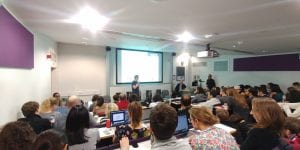Re-orientating the Euro-centric bias in planning and urban studies
By ucyow3c, on 30 November 2017
Written by Audrey Robeson, MSc Urban Studies student, UCL Geography![]()
With a room full to bursting, the launch of Urban Geopolitics: Rethinking Planning in Contested Cities, edited by Jonathan Rokem (UCL Geography) and Camillo Boano (The Bartlett Development Planning Unit, UCL / Urban Lab), was clearly highly relevant to those studying, thinking, and researching contemporary urban studies. People lined up against the back wall, willing to put up with the lack of seating for a chance to hear some of the contributors give a brief presentation of their chapters. Afterwards, three guests were invited to give responses and their comments on the book.

Image credit: Evelyn Teh
‘We’re preparing our army for the last war’: why the academic-vocational divide must fall
By ucyow3c, on 30 November 2017
![]() Written by IOE Events
Written by IOE Events
Tuesday saw the second of our ‘What if…’ events, this time asking What if… we really wanted to overcome the academic-vocational divide?. Our speakers were Sir Michael Wilshaw, Mary Curnock Cook, Tony Little and Professor Alison Fuller.
Vocational education suffers from its second class status – variously seen as a ‘consolation prize’ and ‘for other people’s

children’. It deserves better – for its own sake and for the sake of social justice, but also, as our speakers noted, for the sake of our economy. As Tony Little remarked, ‘we’re preparing our army for the last war’ – the economy and labour market are changing fast, and young people need a broader education. As evidenced by November’s Budget and Industrial Strategy, the government itself seems to have woken from its slumber on skills, and vocational education’s time has come (again). We have been here before, of course, so how can things be different this time around?
UCL Computer Science hosts the founder of virtual reality
By uczruld, on 13 November 2017
 Last week, UCL Computer Science hosted Jaron Lanier of Microsoft Research, who coined the term “virtual reality” and founded one of the first companies to create and sell virtual reality equipment.
Last week, UCL Computer Science hosted Jaron Lanier of Microsoft Research, who coined the term “virtual reality” and founded one of the first companies to create and sell virtual reality equipment.
To an at-capacity lecture theatre, Lanier, who was in London to promote his latest book: Dawn of the New Everything: A Journey through Virtual Reality, described how he started as a computer scientist and what it was like in the earliest days of VR. The lecture left off from the content of his book, which he described as “part memoir, part introduction to VR”.
While Lanier was keen to emphasise his ambitions towards a utopic vision when he started thinking about VR, he also emphasised the capacity that exists within the medium for terror, and how VR could be used in awful ways. For this reason, he structured his talk as a “thesis, antithesis, and synthesis”: putting forward his initial dream-like impetus for thinking about VR, the problematic potential it has for it to go awry, and concluding with a synthesis of his arguments containing some suggestions for how we should move forward.
Education and social mobility – the missing link, or red herring?
By ucyow3c, on 9 November 2017
On 31 October, we held the first in our ‘What if…’ events series, which challenges thought leaders to bring some fresh and radical thinking to key debates in education. We kicked off with the issue of education’s role in relation to social mobility, asking the panel ‘What if… we really wanted to further social mobility through education?’.
First up was Kate Pickett of Spirit Level fame. She rejected the very premise of the question, highlighting the greater impact of wider, pervasive inequalities.
Nevertheless, she saw some scope for education policy to help lessen those inequalities – banning private education, randomising school admissions and ending student fees were a few of her recommendations.
Next was James Croft, chair of the Centre for Education Economics. He was more sanguine about what could be achieved through education and ‘working with the grain’ of the existing system.
 Close
Close

